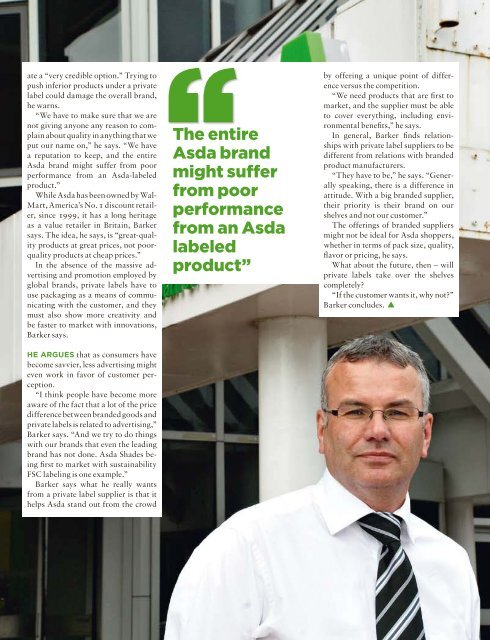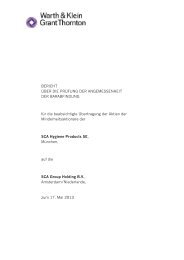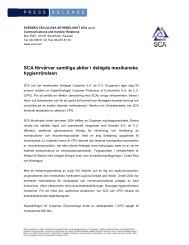Create successful ePaper yourself
Turn your PDF publications into a flip-book with our unique Google optimized e-Paper software.
ate a “very credible option.” Trying to<br />
push inferior products under a private<br />
label could damage the overall brand,<br />
he warns.<br />
“We have to make sure that we are<br />
not giving anyone any reason to complain<br />
about quality in anything that we<br />
put our name on,” he says. “We have<br />
a reputation to keep, and the entire<br />
Asda brand might suffer from poor<br />
performance from an Asda-labeled<br />
product.”<br />
While Asda has been owned by Wal-<br />
Mart, America’s No. 1 discount retailer,<br />
since 1999, it has a long heritage<br />
as a value retailer in Britain, Barker<br />
says. The idea, he says, is “great-quality<br />
products at great prices, not poorquality<br />
products at cheap prices.”<br />
In the absence of the massive advertising<br />
and promotion employed by<br />
global brands, private labels have to<br />
use packaging as a means of communicating<br />
with the customer, and they<br />
must also show more creativity and<br />
be faster to market with innovations,<br />
Barker says.<br />
that as consumers have<br />
become savvier, less advertising might<br />
even work in favor of customer perception.<br />
“I think people have become more<br />
aware of the fact that a lot of the price<br />
difference between branded goods and<br />
private labels is related to advertising,”<br />
Barker says. “And we try to do things<br />
with our brands that even the leading<br />
brand has not done. Asda Shades being<br />
first to market with sustainability<br />
FSC labeling is one example.”<br />
Barker says what he really wants<br />
from a private label supplier is that it<br />
helps Asda stand out from the crowd<br />
<br />
<br />
<br />
<br />
<br />
<br />
<br />
<br />
by offering a unique point of difference<br />
versus the competition.<br />
“We need products that are first to<br />
market, and the supplier must be able<br />
to cover everything, including environmental<br />
benefits,” he says.<br />
In general, Barker finds relationships<br />
with private label suppliers to be<br />
different from relations with branded<br />
product manufacturers.<br />
“They have to be,” he says. “Generally<br />
speaking, there is a difference in<br />
attitude. With a big branded supplier,<br />
their priority is their brand on our<br />
shelves and not our customer.”<br />
The offerings of branded suppliers<br />
might not be ideal for Asda shoppers,<br />
whether in terms of pack size, quality,<br />
flavor or pricing, he says.<br />
What about the future, then – will<br />
private labels take over the shelves<br />
completely?<br />
“If the customer wants it, why not?”<br />
Barker concludes.

















